If you’ve ever killed a plant by overwatering (or underwatering), you’re not alone. It’s one of the most common mistakes plant owners make. The tricky part? Soil can look damp on top but be bone dry underneath — or vice versa. That’s where a soil moisture meter comes in handy.
These little gadgets make plant care easier by telling you exactly what’s going on beneath the surface. Some even measure sunlight, pH levels, and temperature, giving you a complete snapshot of your plant’s environment.
After testing several popular models, I’ve put together my honest reviews of the best soil moisture meters. Whether you’re new to gardening or just want a more accurate way to keep your plants thriving, there’s an option here for you.
1. 4-in-1 Soil Moisture Meter Digital Plant Tester (Moisture/Temp/pH/Sunlight)
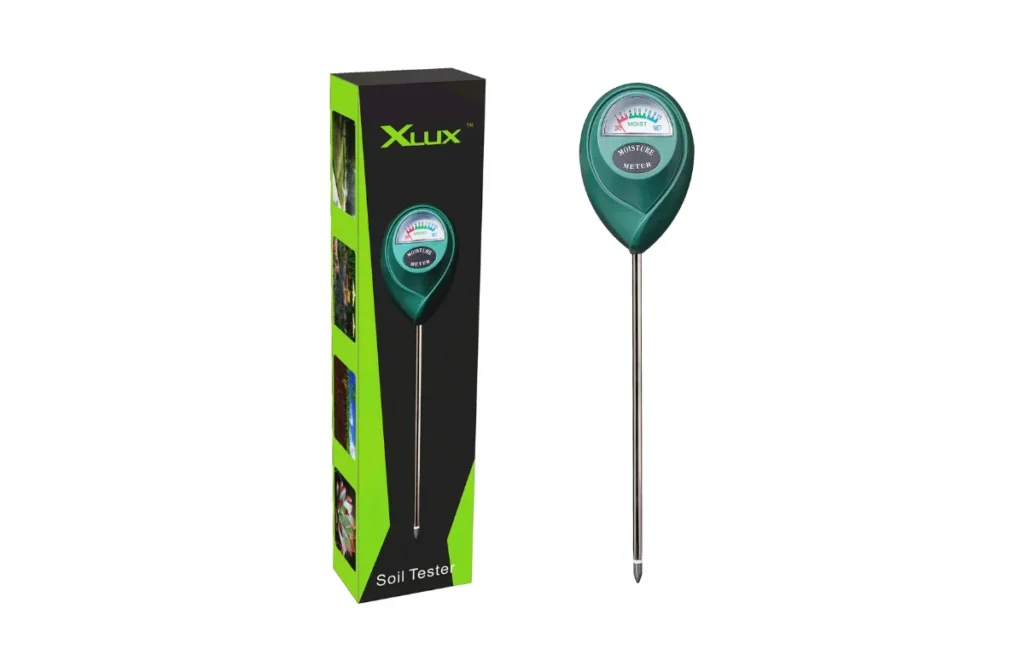
This tester gives you a lot of features for the price. As someone still fairly new to gardening, I didn’t want to splurge on professional equipment, but I needed something to help me manage my blueberry plants. With this meter, I can quickly check soil acidity, moisture, and even sunlight levels. It’s been especially useful for fine-tuning my garden without a big learning curve. Eventually, I might upgrade, but right now this tool is saving me a ton of guesswork.
Pros:
- Affordable compared to pro tools
- Measures moisture, sunlight, temperature, and pH
- Great for beginners learning plant care
Cons:
- Not as durable as high-end meters
- Sunlight readings can feel a little basic
Best For: Beginners who want a multi-function tool without overspending.
2. XLUX Soil Moisture Meter – No Batteries Required
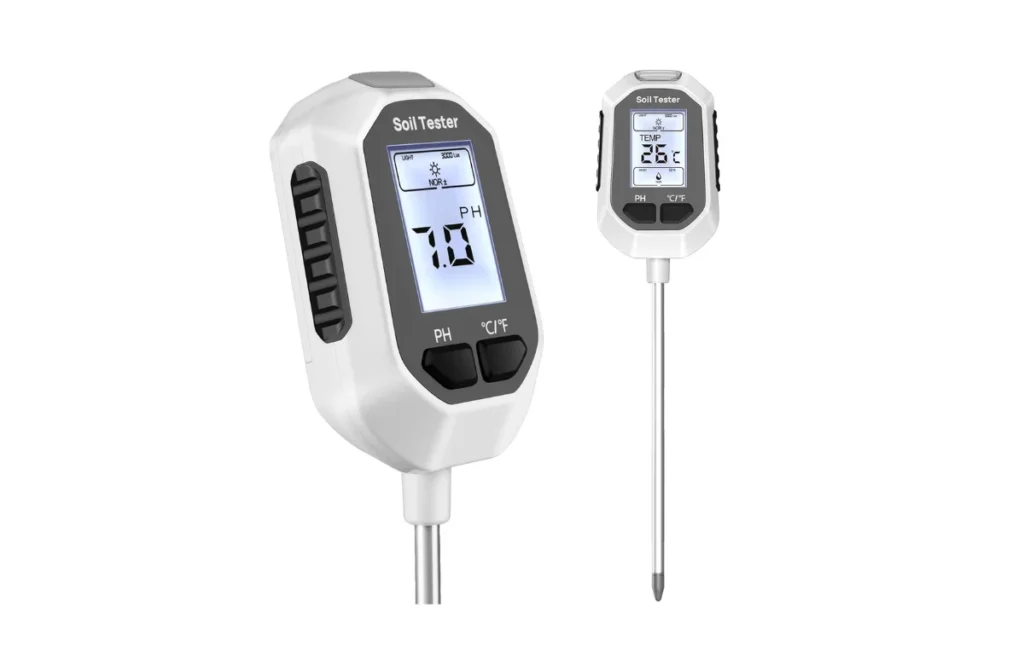
This one’s a no-brainer if you just want to know when to water. The XLUX is battery-free, which means it’s always ready to go. The dial is clear and easy to read, and I found it especially handy with my houseplants. I tend to overwater, so having a quick way to check before grabbing the watering can has saved me from drowning my succulents more than once. It’s not loaded with features, but that’s also what makes it simple and reliable.
Pros:
- No batteries needed
- Clear, easy-to-read dial
- Reliable moisture readings for everyday use
Cons:
- Only measures moisture
- Needle feels delicate if pushed too hard
Best For: Plant parents who want a simple, foolproof way to know when to water.
3. Soil Moisture Meter, Basic Hygrometer for Plants
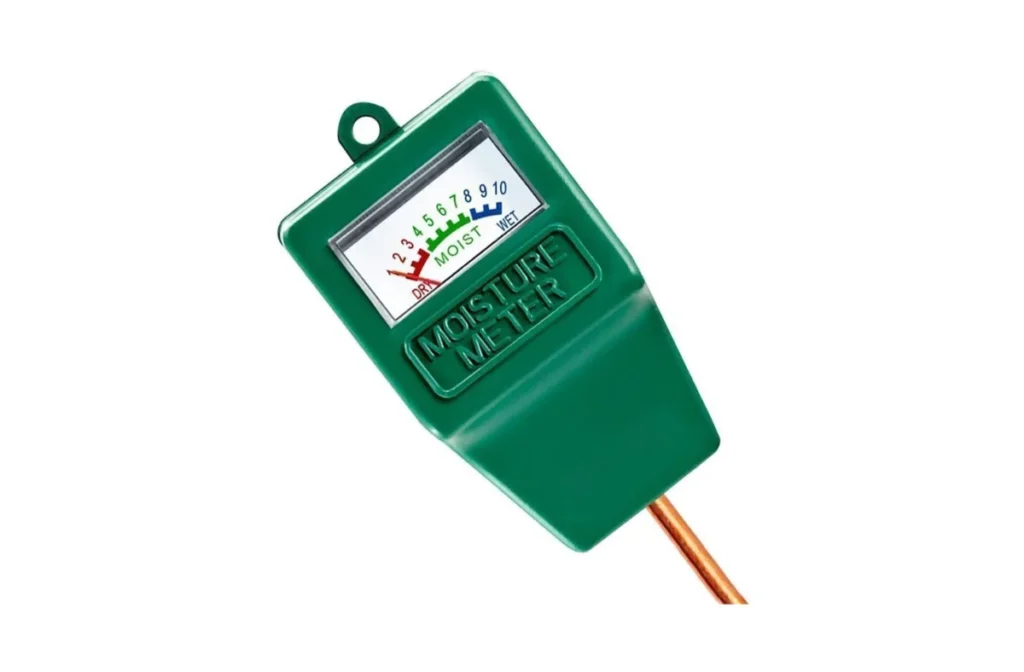
If you want something lightweight, budget-friendly, and straightforward, this one does the job. It doesn’t need batteries and works just as well outdoors as it does with potted plants. I used it in my vegetable garden and liked that it gave consistent readings without much effort. It’s not fancy, but it’s a great little helper if you’re mainly concerned about moisture levels.
Pros:
- Very affordable
- Works indoors and outdoors
- No batteries required
Cons:
- Limited to moisture only
- Build quality feels a bit flimsy
Best For: Budget-conscious gardeners who need a quick moisture check without extra bells and whistles.
4. 4-in-1 Soil Moisture Meter (Moisture/Light/Nutrients/pH)
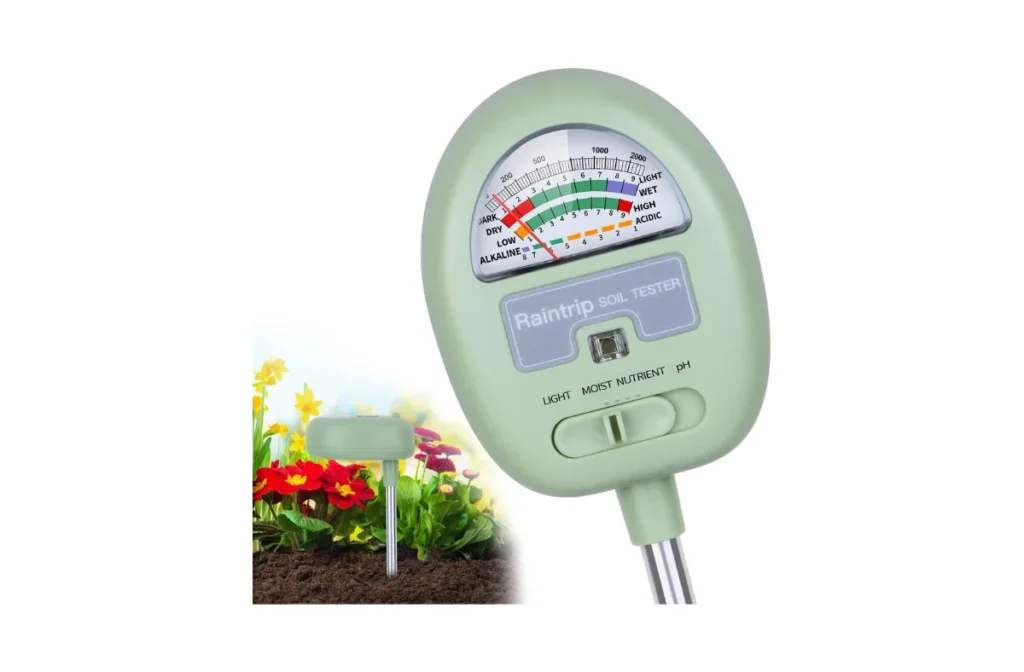
This one impressed me because it goes beyond just moisture. Along with light and pH, it also gives nutrient readings — a big plus if you’re serious about soil health. I tested it both indoors and on my lawn, and the results were consistent. No batteries required, and the build feels more solid than cheaper analog meters. The nutrient reading takes a bit of practice to interpret, but once you get the hang of it, it’s a game-changer for improving soil quality.
Pros:
- Measures 4 key factors, including nutrients
- Sturdy, durable build
- No batteries required
Cons:
- Pricier than basic models
- Nutrient readings can be tricky at first
Best For: Gardeners who want more insight into soil health without going pro-grade.
5. 4-in-1 Digital Soil Meter (Moisture/Temp/pH/Sunlight with LCD Display)
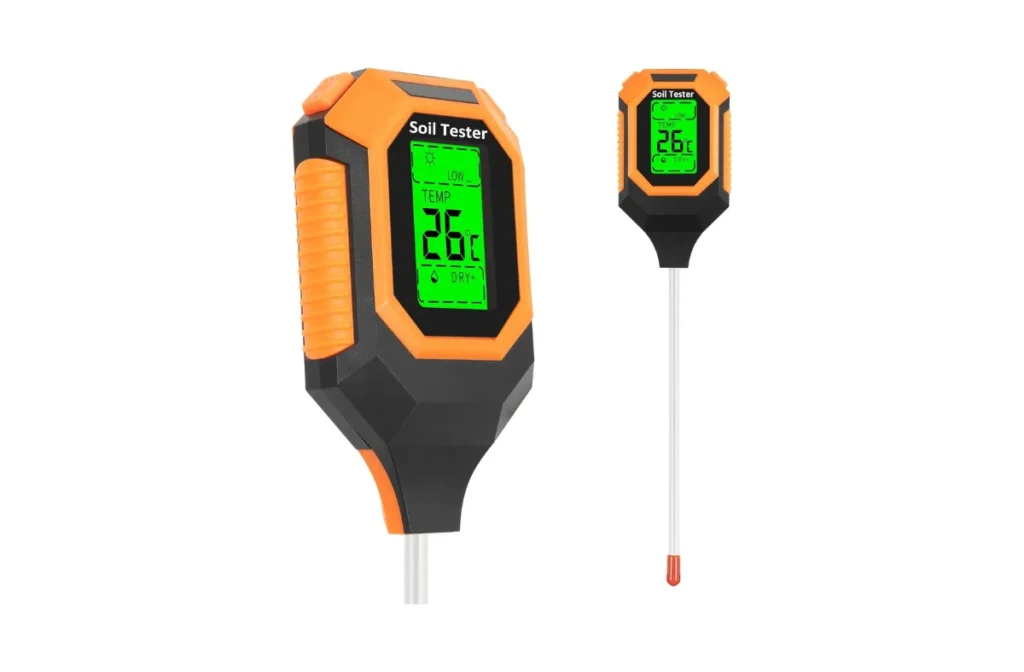
This digital version is perfect for those who like a modern interface. The backlit LCD makes it easy to read in low light, and the accuracy felt slightly better than some analog models I’ve tried. It measures moisture, sunlight, temperature, and pH, making it versatile for different plant types. I liked using it for my raised beds outdoors since it gave me a clear read even when I was gardening in the evening.
Pros:
- Easy-to-read digital display
- Backlight for low-light use
- Covers four major plant needs
Cons:
- Requires batteries
- More expensive than analog versions
Best For: Gardeners who want a digital, easy-to-read meter with multiple functions.
6. apine Soil Moisture Meter (Green, Simple Design)
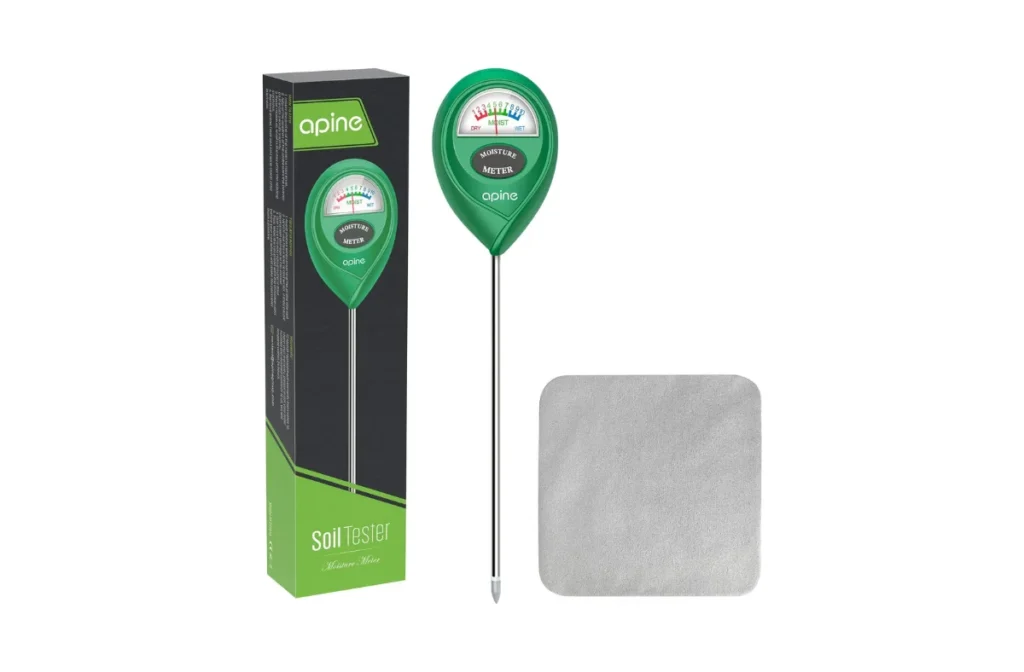
The apine is simple, affordable, and great for beginners. It doesn’t have the extra features of some of the other models, but it’s consistent enough to keep you from overwatering. I found it especially handy for my succulents and snake plants, where it’s easy to go overboard with water. It’s light, easy to stick in the soil, and requires no setup.
Pros:
- Affordable entry-level option
- Lightweight and easy to use
- No batteries required
Cons:
- Only checks moisture
- Not as durable as higher-end meters
Best For: Beginners or casual plant owners who want a basic, no-fuss tool.
Comparison
| Product Name | Key Feature | Specs | Pros |
|---|---|---|---|
| 4-in-1 Digital Tester | Measures moisture, temp, pH, sunlight | LCD display, battery powered | Affordable, multi-function |
| XLUX Moisture Meter | Moisture-only, no batteries | Analog dial | Simple, reliable, no fuss |
| Basic Hygrometer Moisture Meter | Budget-friendly moisture reading | Analog, no battery | Lightweight, works indoors/outdoors |
| 4-in-1 Analog Soil Tester | Moisture, light, nutrients, pH | No battery required | Sturdy, nutrient insights |
| 4-in-1 Digital LCD Tester | Moisture, temp, pH, sunlight | Backlit LCD, battery powered | Digital accuracy, versatile |
| apine Moisture Meter | Simple moisture check | Analog, no battery | Affordable, beginner-friendly |
Buying Guide – What to Consider Before Buying the Best Soil Moisture Meter
- Accuracy: Look for consistent readings that match your plant’s real condition.
- Functions: Decide if you just want moisture checks or a full soil health report (pH, nutrients, light).
- Ease of Use: Analog meters are simple and don’t need batteries, while digital ones give clearer readouts.
- Build Quality: Sturdier probes are better for outdoor soil and frequent use.
- Price: Basic models are cheap and effective, while advanced testers cost more but add value for serious gardeners.
FAQs
Do soil moisture meters really work?
Yes — they’re a reliable way to know when to water and prevent root rot or drought stress.
Should I get a digital or analog meter?
Analog is simple and battery-free, while digital gives more detailed readings and is easier to read.
Can I use one meter for all plants?
Absolutely. Just be gentle when inserting into softer or smaller pots.
How often should I test my soil?
For indoor plants, once or twice a week is enough. Outdoor gardens may need more frequent checks during hot months.
Final Thought
Self watering pots are a smart choice for anyone who wants healthy plants with less effort. They save time, prevent overwatering, and keep your indoor and outdoor plants thriving. For more ways to upgrade your garden space, check out this guide on the best outdoor solar lanterns.
Disclosure
As an Amazon Associate, I earn from qualifying purchases.
